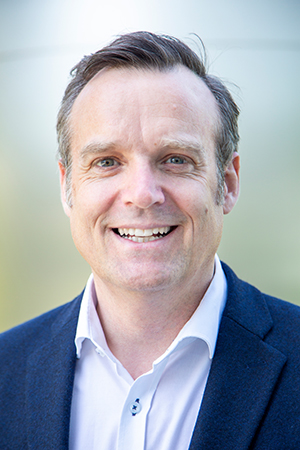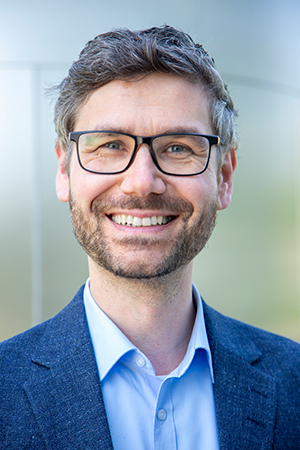“New problems call for new experts”
![[Translate to Englisch:] Christoph Becker und Prof. Jan-Philipp Hoffmann diskutieren im Hörsaal](/fileadmin/_processed_/4/e/csm_230503-FB-MATH_C7A8683_25336d85fd.jpg)
Darmstadt professors Christoph Becker and Jan-Philipp Hoffmann have started their own YouTube series aimed at giving viewers an understandable overview of what’s going on in the financial system – and making people enthusiastic about their subject.
Interview: Kilian Kirchgeßner, 23.5.2023
impact: Your videos are noticeably different: you haven’t dyed your hair blue like other YouTubers and you don’t jump around in front of the camera.
Christoph Becker: True. And in contrast to some YouTubers with blue hair, we don’t broadcast a scathing critique of a political party and then just come to an abrupt halt. Seriously, of course we want to point out problems in the financial system in a clear and critical way. But then we want to situate them in the bigger picture and look for possible improvements that are realistic and can be put into practice. Continue to get bogged down analysing the problems? We can no longer afford that!
impact: How did you come up with the idea of making videos together in the first place?
Becker: We share an office, so it happened all by itself. It was simply by chance.
Jan-Philipp Hoffmann: Hang on a moment! Until now you’ve never said ‘chance’ but always ‘lucky chance’… (they both laugh). But seriously, tackling the project together is inspirational because we sometimes see things completely differently and chisel away at a problem from two sides, as it were.
Becker: I prefer to take a bird’s eye view. Take the current banking crisis in the US: What does it mean for the financial system as a whole? What does it mean for asset managers, what does it mean for our small bank around the corner? That’s the level on which I like to work...
Hoffmann: …and I came to the university four years ago from a bank and tend to choose the financial management perspective: How do you deal with the upheavals at operational level, how can you react? By comparing the two perspectives, we indeed navigate towards each other each time and find common ground again. We would like to take our audience with us on this journey through different perspectives and explore the facts.
impact: Within the complex context of the financial market, what is then the thematic starting point for your videos?
Becker: To answer that question, let’s just look at current issues – the energy transition, for example, and the transmission line infrastructure necessary for it. Someone has to pay for this infrastructure – so from a financial market perspective, is this simply the next big investment proposition or might it not also become the next bubble? Do we now want to leave the infrastructure to private investors, and, if so, what might go wrong? Is it a good idea for basic infrastructure to be owned by funds that operate globally? Since 2008 at the latest, it has been clear to many people that this global financial system with all its funds is not really trustworthy – but with the small bank around the corner everything works quite well. This presumed certainty is now showing cracks as well – so who should we trust to finance the infrastructure?
Hoffmann: You can already see from this answer how many questions crop up when you first immerse yourself in the topic. We’re trying to explain what recently happened at the Silicon Valley Bank in the US, for example – and we want to make it tangible from a mathematical perspective, that is, calculate it.
Update Financial Markets #3: Local Funding (in German)
Update Finanzmärkte #3 (Prof. Dr. Christoph Becker)
impact: Do you also use your videos in your teaching?
Becker: Yes, I often report on important developments in the financial market over the past week at the beginning of my courses and relate them to the lecture content. The video series “Update on Financial Markets” is in principle a more detailed version of this. But in the courses themselves, mathematical correlations then generally play a greater role.
impact: The topics you address essentially stem from economics and business administration. But you’re a financial mathematician. Why should you be the one to explain those correlations to me?
Becker: For economists, economic correlations are at the forefront; we combine that with mathematics. To put it simply: we want to explain the correlations – and then use our data science instruments to target the right questions.
Hoffmann: In many degree programmes, you generally learn as much mathematics as you need to answer previously known questions in an expedient way. Figuratively speaking: You get exactly as many utensils as you need to cook. But we have the experience to recognise where the limits of existing methods lie – and which other instruments can help. Of course, this is particularly important in situations like now, where existing theories no longer offer a sufficiently deep explanation. So we’re bringing a lot more utensils into the kitchen.
impact: Please feel free to be a little more specific: Where exactly do existing theories reach their limits?
Hoffmann: There are certain mathematical methods, for example, that were mostly used 15 years ago to handle interest rates. What these methods were unable to handle was negative interest rates – because, according to the prevailing opinion at that time, they simply didn’t exist. Shortly afterwards, there were suddenly negative interest rates, and the models no longer worked, meaning that anyone who had only learned this one method was all at once out of their depth in this area. We, by contrast, can also use new mathematics for new problems.
Jan-Philipp Hoffmann is Professor of Financial Mathematics at h_da. After studying in Göttingen and earning his doctoral degree in Göttingen and Barcelona, he held management positions at several banks. One of his research interests is model risks. He examines under which circumstances and for which objectives mathematical models can be used to generate knowledge and where the limits lie that can lead these models to wrong conclusions.
Christoph Becker is Professor of Financial Mathematics and Stochastics at Darmstadt University of Applied Sciences. His research interests are risk management and stability of the banking and shadow banking system, the further development of the financial system to finance the energy transition, as well as financial market econometrics and data science. Christoph Becker worked as a risk manager at Commerzbank AG in Frankfurt. He studied Applied Mathematics at the University of Trier and earned his doctoral degree in Financial Mathematics at the Frankfurt School of Finance & Management.
impact: To stay with your kitchen metaphor, that sounds like a highly complex cooking show: full of formulas, rows of numbers and data packets.
Becker You’re mistaken. Mathematics does not necessarily take centre stage in our video project. In our everyday lives, we both hear the same negative comments time and again: “How can anyone only be interested in finance and mathematics? How can you spend your whole career doing that?” We want to communicate which financial questions and mathematical methods make the whole story so interesting. The fact that we focus more on the big financial questions rather than on the mathematical details is perhaps also explained by the nature of the format: in relatively short videos, it’s easier to talk about current financial topics than about detailed mathematical models.
impact: Just a moment: financial mathematics without maths – how does that work?
Hoffmann: In our research and teaching, we are, of course, dealing with very complex mathematics. This is precisely why banks, insurance companies and other institutions are searching desperately for graduates. However, we don’t want to hold lectures in our videos but instead address a broader target group.
impact: With regard to viewers: Who is, in fact, your target group?
Becker: It would be great, for example, if school leavers interested in these topics and who are about to choose a degree programme would watch our videos. But we’re also targeting a broad public of critical and interested citizens. We want to provide more information and above all context than the daily press, without getting lost in the level of detail of lengthy research papers. Just as much as is necessary to be able to participate in the public debate on the financial system in an informed way and to form your own opinion.
Hoffmann: Think of the bank failures that lots of people find concerning. If someone is unable to picture the financial system and the corresponding correlations in their head, discussions on this topic are ultimately always fruitless. Once they can picture this, turning the various cogs in their mind’s eye becomes fun.
impact: Do you find that you’re preaching to the converted with this topic? That people are no longer “appalled” when they learn that you’re a financial mathematician but instead interested and ask questions?
Becker: I remember that during my doctoral degree I preferred not to mention that I was dealing with derivatives because the reaction was always: “Oh, so you’re one of those!” (laughs)
Hoffmann: The fact is that when things are going well in the world, nobody talks to you about it. But when there is a crisis, people like to ask: Is there a major banking crisis on the horizon? What’s going to happen now with inflation? In the current situation, a lot of people are interested in that, and that’s precisely why we think it’s important to lay the foundation for an informed discussion. And with mathematics and calculations, we really do create understanding; with a strictly rational view, it’s possible to gather insights and perhaps develop solutions.
Becker: If we succeed in taking our viewers along this journey with us and perhaps even in inspiring them, that would be great. And maybe a few young people will be interested in studying the topic with us. We need more of them!
Translation: Sharon Oranski
Contact
Christina Janssen
Science Editor
University Communication
Tel.: +49.6151.533-60112
Email: christina.janssen@h-da.de
All videos can be found on h_da’s YouTube channel: www.youtube.com/hochschuledarmstadt

